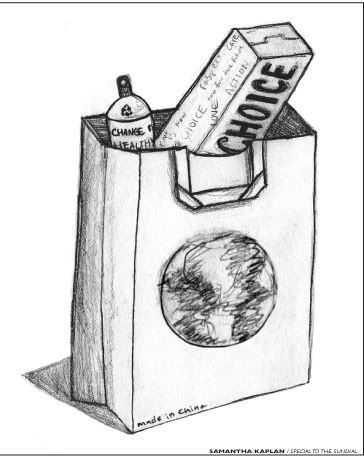
Have you ever been so thrilled to receive a cool breeze in the midst of the summer heat? And what a nice surprise to turn the corner and feel a cloud of sweet fragrance hit your face as the jasmine flowers bloom across campus in late spring? And don’t you just love a cool shower on a hot day?
Not only does nature provide everything we need for our sustenance, but we also get to enjoy these natural pleasures, and we even have the luxuries of iPods, pillows and massage chairs. As exciting as it is to indulge these luxuries, it is important that we take a critical look at our habits of consumption.
The earth is plentiful, but its resources are finite. We live in a closed system. Water is not added to the earth every year. The water that is available today is the same water that was on our planet thousands of years ago and is the same water that will be here in hundreds of years. All of the chemicals that we introduce into this system will stay in it for our lifetime and beyond. However, we have the power to make positive choices?so that we do not have such a detrimental impact of earth’s finite resources.?
As it stands, Americans, consisting of only 5 percent of the world’s population, consume 30 percent of the entire world’s resources and create 30 percent of the world’s waste. If every country produced as much as we did, we would need three to five planets to sustain our current population.
Our population’s daily consumption has risen to an all-time high, but its not too late to create a cleaner and less polluted future. We can either use up all the precious gifts of the earth or we can each do our best to reduce our impact and work towards a more sustainable future.
We can live in harmony with nature by choosing simple alternatives that are more sustainable.?Here are five simple choices we can make?
1. Be aware that everything in nature is interconnected and each time you choose to consume something, you are taking a resource from the planet. Resource consumption is perfectly fine if it is part of a cycle, but when we consume something and the end result is a lifetime in a landfill, we are hurting the planet. The Iroqouis looked at it this way?they believed that every choice one makes today will impact the next seven generations. So look at your choices-how are they affecting the planet? Are you using paper cups everyday? Is your Kleenex coming from old growth forests in the Amazon? Are you contributing to the over-fishing of our oceans?
2. Get away from the idea that things are disposable. When you throw something “away” it doesn’t just disappear-it moves to a landfill where it sits and rots for thousands of years, breaking down into things that we sure don’t want in our drinking water. Disposable items not only use resources and energy to be created, but they become waste. They are an end product instead of being part of the cycle. On the other hand, a reusable bottle, for example, will save hundreds of plastic bottles over a couple of years which in turn saves money and energy, and reduces pollution. It is important to look for products that are meant to be reusable rather than disposable.
3. Buy local. Buy organic. When you buy things that are local, airplanes and ships are not used to transport them, so tons of air pollutants are spared. Take for example choosing to buy fruit from your local farmers market-it has a lower carbon footprint and provides you with the sweetest and freshest produce you can get (Northridge Mall, Wednesday 5p.m. to 9p.m., or find your local market at http://www.farmernet.com/events/cfms). When you choose to buy organic, you are keeping chemicals off your plate, and out of the soil and groundwater.? The bottom line is that pesticides are poisons designed to kill living organisms and you wouldn’t want to be eating deadly chemicals.
4. Create green habits for yourself. Some of the little changes you can make that add up to more savings? Turn off lights when not in use, use day light instead of artificial lighting, grow indoor plants for improved air quality, use a reusable water bottle, choose Tuperware instead of plastic baggies, bring your own travel mug to Starbucks or Jamba Juice (it will even save you money), and anything else you can think of!
5. Visit www.thestoryofstuff.com and watch the short animation which connects consumerism and environmental impact. It provides a stunning and comprehensive perspective as well as a sound solution.
Let’s keep in mind is that the most helpful things we can do as humans is to just be aware. Let awareness bring about change. Let’s make the smartest decisions we can about the things that we consume. Our healthy habits of consumption create a healthier environment. The time to change is now. Let’s each do our part for the planet, for us, and for future generations.





